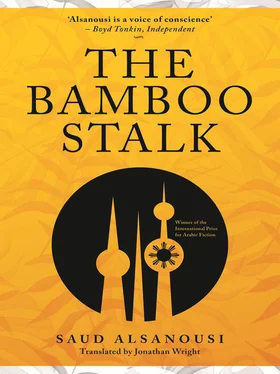‘I’ll cut out Umm Jabir’s tongue,’ I said. ‘I will not be the cause of you leaving the house you love so I’ve decided to leave.’
Although she was sad, Khawla didn’t insist I stay. Slightly shocked, she just said, ‘To the Philippines?’
‘To Kuwait,’ I replied. For the first time since I’d come to her house, Grandmother gave me a big hug as soon as she heard of my decision, and almost suffocated me. She let go of me after planting a kiss on my cheek. She turned to Khawla and asked her to translate what she was going to say. Highly embarrassed, Khawla said that on top of the 200 dinars a month, Grandmother would now give me another 200, so now I would have a monthly allowance of 400 dinars. I nodded gratefully.
Grandmother talked again to Khawla, who then turned to me. ‘She’ll also give you her share of Father’s pension,’ she added. Both of them were red in the face, out of embarrassment in the case of Khawla, out of happiness in the case of Grandmother. I turned my back on them and went back to my room, which would soon no longer be my room.
* * *
On the evening of the second day of the Eid, Ibrahim Salam was waiting for me outside in his car. As I was picking up my suitcase, Khawla opened the door to my room and for the first time she took a few hesitant steps inside. The fact that she came in like that disconcerted me. I left my suitcase on the floor and watched her. She stood in front of me, examining my face. I was so anxious my throat felt dry. Her face was completely expressionless. I tried in vain to smile but I couldn’t because I was so taken aback that Khawla had ventured into the danger zone. She put her hands under her chin and fiddled with something and her hijab came loose. She grabbed it from the part nearest her forehead, took it off her hair and let it fall to her shoulders. She shook her head and tossed her hair free. She looked straight into my eyes. I almost burst into tears. She wrapped her arms around me and buried her face in my shoulder. ‘I’ll miss you, brother,’ she said.
My arms hung down and I didn’t reciprocate. My heart was pounding. She kissed me on the cheek, then turned and went back where she had come from, covering her hair with her hijab . Her words rang in my ears. The word ‘brother’ continued to echo even after she had left the room.
It was the first time Khawla had called me brother and, just one day earlier, Grandmother had embraced me and kissed me, also for the first time. If I had known that would happen I would have left the Tarouf house much earlier. I picked up my suitcase and turned off the lights. In the outer courtyard I looked towards the kitchen. Babu, Lakshmi and Luzviminda were behind the window watching me. They waved sadly. I left Grandmother’s house behind me. As I was putting my suitcase in the boot of Ibrahim’s car, Raju appeared from behind the garage door. He threw a cigarette end on to the floor and crushed it with his foot. He turned to me and said, ‘Goodbye’, then closed the door.
Hind’s car was in its usual spot under the awning. She was at home but she didn’t come out to say goodbye. I understood her attitude: how could she say goodbye to me when she had failed to play the role she should have played in my case?
I’m not blaming her, because, as my mother said of my father one day, ‘The decision is out of one’s hands if a whole society stands behind it.’
2
Ibrahim Salam shared his room with me temporarily, until I could find somewhere permanent to live. ‘Why do you have to live in Jabriya?’ I asked Ibrahim, since I had only painful feelings about the area. My father’s friend had died in a plane with the same name and it was in the same area that the friend who had betrayed him lived. ‘Because it’s close to my work in the Philippine embassy,’ Ibrahim explained.
One night I asked him to tell me about the Prophet Muhammad in return for me telling him about Jesus Christ, rather like those bedtime conversations that Cheng and I used to have about Jesus and the Buddha. ‘I’ll tell you about the Prophet Muhammad, but you don’t need to tell me about Jesus,’ he replied. When I asked why not, he answered confidently, ‘I’m sure I know more about Christ than you do.’
He often spoke to me about Islam. I was interested in some of the similarities between the Qur’an and the Bible. Was Islam a new religion, as I had thought, or a supplement to religions that predated it? Ibrahim told me about the previous holy books that the Qur’an refers to. When I asked him about those books, he picked up a copy of the Qur’an and translated some passages, including one I remember from the chapter called ‘Women’: ‘Behold, We have inspired you, just as We inspired Noah and all the prophets after him — as We inspired Abraham, and Ishmael, and Isaac, and Jacob, and their descendants, including Jesus and Job, and Jonah, and Aaron, and Solomon; and as We vouchsafed unto David a book of divine wisdom.’ I understood from what he said that Islam didn’t dismiss the religions that came before it, because the Qur’an refers to the earlier religions, mentions the prophets by name and tells us they were all sent to mankind by God. Ibrahim switched some lights on in my head but turned out others. When he saw I was confused, he seemed more interested than me in the subject. I don’t know if he was trying to convince me or convince himself. He closed the Qur’an and put it back in its place in a drawer near his bed. He told me about miracles I had never heard of. Clouds that spelt out the word ‘Allah’ in the sky, a watermelon with seeds arranged to form the name of the Prophet Muhammad, a fish with stripes that could be read as Allah, and other stories like the ones I used to hear in the Philippines about statues of the Virgin Mary that shed tears or about the Virgin Mary appearing in some place, which would soon become a shrine. Ibrahim amazed me and it showed on my face. In response to my amazement he would ask confidently, ‘So? What do you think?’
I was amazed in the sense of being underwhelmed, but Ibrahim read it the opposite way. ‘These are just fantasies,’ I told him in the end. He turned pale. ‘If only you’d stick to reading the Qur’an,’ I added.
He took a folded piece of paper out of the drawer where he kept the Qur’an. ‘I’m going to show you a miracle,’ he said. I had goosebumps. Although I don’t believe in such things, he was so enthusiastic that I braced myself to see something new.
‘It happened more than two years ago, in December 2004,’ he said.
The date brought back memories of disaster and I interrupted him. ‘That was when the tsunami hit several countries in East Asia,’ I said.
He nodded. ‘That’s right, brother,’ he said.
‘The waves hit one particular island,’ he continued, unfolding the piece of paper. ‘It flattened the whole area but saved the. .’ He left the sentence open so that the piece of paper could finish off what he wanted to say. It was a big glossy colour picture of a white mosque standing intact amid the devastation.
‘Where’s the miracle?’ I asked him, as amazed as ever.
‘Look. There’s nothing left of the houses around the mosque. Everything was swept away by the waves and only the mosque survived.’
My goosebumps disappeared with disappointment. ‘Ibrahim!’ I said. ‘The houses around the mosque were made of wood and corrugated iron, while the mosque had foundations that went deep into the ground and was build of concrete, with concrete pillars.’
‘Are you casting doubt on Islam?’
I shook my head. ‘No. But I am casting doubt on your ridiculous miracles. Would God send a tsunami to destroy the houses of the faithful around the mosque just so that people who didn’t believe in God will see that this is the true religion?’
Читать дальше












